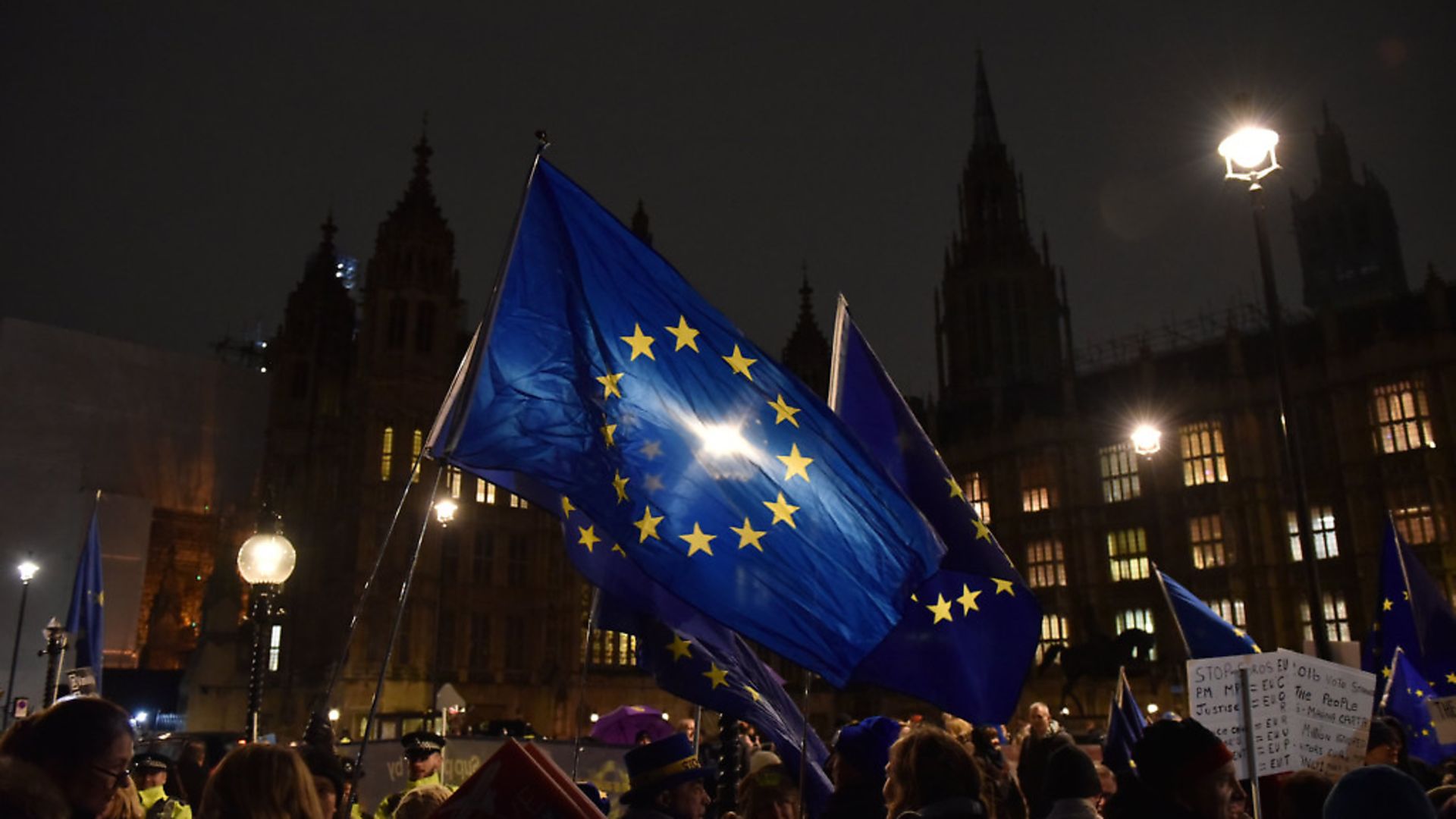
ALASTAIR CAMPBELL on the implications of Brexit and why it is time for a rethink.
Just. Make. It. Stop.
Sounds good. After all, who doesn’t have a Brexit headache by now? Whose heart doesn’t sink a little every time a reporter comes on to tell you the same groundhog story as a day, a week, a month, a year ago? Who hasn’t lost sleep over this madness? How could any patriot not lose a little sleep when so much is at stake and so little is clear? I have.
I even dreamt about Theresa May last weekend – thankfully my Trump dreams have abated – and it wasn’t pleasant. I was trying to show her a draft speech in which she set out the Brexit options, all of which by the government’s own analysis would leave country, citizens and public services worse off, and she rose from behind her desk and shouted at me ‘this isn’t about fact, it’s about feeling’.
I looked at Jeremy Heywood, recently deceased cabinet secretary, standing behind her – and my God could we do with him having lived longer – and he just shook his head gently as if to say ‘this is what we’re dealing with. It’s hopeless’.
It was an odd thing for my sleeping subconscious to project onto May, as feeling is not exactly her strong suit. But there is something fantastically irrational about a prime minister whose Withdrawal Agreement was so resoundingly defeated in the parliament to which she is answerable and yet who clings so defiantly to its wreckage, seemingly confident that when the storms pass it will be the only craft still floating. Perhaps our living in such irrational post-truth times is what gives her the confidence that she might yet prevail.
May herself really would not be human if she wasn’t losing sleep too. The political, economic, diplomatic and personal stakes are enormous. A place in history for her is secured, but the judgement of history on her premiership is not, and the forces which will decide it are only very partially under her control.
Chaos is a possibility, and can she really look at her team of ministers and imagine for one moment they would be able to deal with it effectively? Businesses warning of taking jobs and investment elsewhere are not bluffing. Some are doing it already. Her party may yet split if she makes the wrong calls at the wrong time. The union of the four nations of the UK itself may be placed under pressures it can no longer withstand. These are far from trifling issues and few could have them on their agenda without occasionally finding sleep interrupted.
The Brextremists too must be tossing and turning, despite yet again pushing her in the direction they wanted in the Commons on Tuesday, sending her off to the next round of Brexit Fantasy. But did they strike against her too soon, their failed motion of no confidence likely cementing her in place for another year? If the clock ticks on, when the inevitable extension is called for, if the March 29 deadline perhaps passes and we are still not out of the EU, do they worry their Brexit dream begins to evaporate once the psychological hold of that deadline is gone?
If the parliamentary impasse continues and eventually MPs on both sides decide in large numbers that the whole issue must go back to the people, can they be confident of winning when so many of the arguments that helped them win in 2016 are redundant and so much of what was called Project Fear has turned out to be, if anything, a conservative estimate of how difficult and costly things were going to be?
Fair play to the bed company whose poster on the London Underground caught my eye the other day. They know. Sleep deprivation is one of the many unintended consequences of the mess we are in.
So – Just. Make. It. Stop. Take the tooth out. Sort the backache. Drain the ear of its infection. Please, please let me sleep. Just. Make. It. Stop. The problem is, in these crazy times, Just. Make. It. Stop can work both ways.
For hardcore Remainers, the ‘it’ is Brexit. For hardcore Brexiters, the ‘it’ is the debate, the delay. Because the people spoke, did they not, and they said they wanted the UK to leave the EU. So why are we still talking about it? When are we going to stop talking about it? Will we ever stop talking about it? We certainly won’t if Theresa May, through her campaign of attrition, clarity avoidance and time-wasting, somehow turns the biggest defeat in parliamentary history into an eventual win and her deal, which MPs on both sides of the Brexit divide have been right in saying is a bad deal for the country, becomes the basis of our departure; because we will be arguing about what ‘Brexit means Brexit’ actually means for years to come as the country finally confronts the choices about our economic future that her deal avoids.
Nor are we likely to stop talking about it if Labour get its way and we head to a general election which, given both main parties are split, and neither is exactly well set for a landslide, may not settle the issue at all. So Brexternity beckons.
Indeed, if memory serves me right, the last time I was on BBC Question Time, well before the Fiona Bruce era (not being a comedian or a Brextremist who hates facts I have not been asked back since), the Brexit question was on the lines of ‘Why haven’t we left yet?’ Cue applause from the deeply unbalanced audience Question Time somehow manages to build wherever it goes.
The answer, as we all know by now, is that delivering Brexit has turned out to be a lot more complicated than anyone, even the architects of the Project Fear campaign, let alone the liars of Leave, ever imagined. Project Fear which was so spectacularly lacking in imagination that it did not even float the idea doing the rounds in government in recent weeks that we might need to impose martial law and have troops patrolling the streets, not to deal with Islamist terrorism but middle England rioters going on the rampage as their supermarket shelves empty of basic essentials.
Another poster caught my eye; from an anti-Brexit campaign group keen to make sure we do not forget the lies, broken promises and fanciful statements of the politicians who led us to this pretty pass, and which plastered up the 2015 David Cameron tweet I mentioned recently – ‘Britain faces a simple and inescapable choice: stability and strong government with me, or chaos with Ed Miliband’. It really hasn’t aged well, has it?
Cameron was always good at message. After all, how did he become prime minister if not by persuading at least some of our fellow citizens of the truth of his central message about ‘broken Britain’. Remember that one? Perhaps he was a prophet in his own land. Back then it was one of many among a litany of vacuous slogans. Now it is a good description of what we are becoming. And his referendum was a big factor in its creation.
Our politics feels broken, May’s survival of such a huge defeat is but the latest symbol of it. Millions feel politically homeless. The massive challenges we face are not being properly addressed, let alone met, because the government is utterly consumed by one issue only.
Our public services feel like they are at breaking point and the pressures on them will only be exacerbated by Brexit: Nine out of ten state schools facing spending cuts; police forces warning they are reaching a tipping point; prisons in turmoil; mental health services going backwards; child poverty rates rising; people sleeping on the streets normalised; our relevance in foreign policy, and our defences, weakening.
This is not all down to Brexit. But much of it is, and Brexit is certainly not helping. Add it all together, and you see that Cameron’s description is becoming all too true.
Can any Brexiter truthfully say, hand on heart, that Brexit is proving to be good for Britain? – when even the most ardent of them have gone from promising sunlit uplands to ‘it’s not going to be that bad, we’ve survived wars so we can survive this, and we hopefully we won’t have to stockpile food and medicine’.
Brexit is breaking Britain. That is the ‘it’ that needs to be stopped. So let’s stop Brexit breaking Britain. There is only one way to Just. Make. It. Stop. And that is Not. To. Do. It.
So let’s ask the people – do you still want it? The desperation of the Brextremists to avoid the question being put is a useful indicator to the likely answer.









